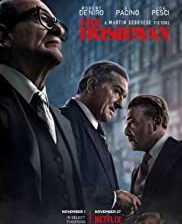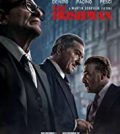- Two Thanksgiving Thoughts for the ACAPosted 11 years ago
- Shop til you Drop at the Healthcare Marketplace Part 2: Frustration!Posted 11 years ago
- An Early Casualty in the Affordable Care FightPosted 11 years ago
- Some Good News for a ChangePosted 11 years ago
Oscar Night Review
Quick: Name the three previous Best Picture Oscar winners.
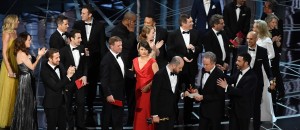 While you’re “um”ing and “er”ing trying to remember, I’ll bet when someone asks, “Who won Best Picture the year ‘La La Land’ came out?”, you’ll remember it was “Moonlight.” It’s in that way the “Moonlight” film makers owe a debt of gratitude to the now-historically star-struck, incompetent, tweet-obsessed PricewaterhouseCoopers buffoon for that shocking foul-up. When “La La Land” producer Jordan Horowitz stepped forward and said “Moonlight” was the actual winner and held the card up for the camera to see, it was just like the end of the finale of The Sopranos, when we were thrown into a Twilight Zone of disorientation right at the final, climactic moment of what we were watching. Even when we realized what had happened, we were still reeling into the morning. I found it hard to sleep, and it wasn’t like it was something I was directly affected by. I’m still telling myself it’s good to have things shaken up from time to time. Ultimately, it’s relatively harmless and good for a laugh when the dust settles and it catapulted an already-memorable Oscar broadcast into the realm of TV legend.
While you’re “um”ing and “er”ing trying to remember, I’ll bet when someone asks, “Who won Best Picture the year ‘La La Land’ came out?”, you’ll remember it was “Moonlight.” It’s in that way the “Moonlight” film makers owe a debt of gratitude to the now-historically star-struck, incompetent, tweet-obsessed PricewaterhouseCoopers buffoon for that shocking foul-up. When “La La Land” producer Jordan Horowitz stepped forward and said “Moonlight” was the actual winner and held the card up for the camera to see, it was just like the end of the finale of The Sopranos, when we were thrown into a Twilight Zone of disorientation right at the final, climactic moment of what we were watching. Even when we realized what had happened, we were still reeling into the morning. I found it hard to sleep, and it wasn’t like it was something I was directly affected by. I’m still telling myself it’s good to have things shaken up from time to time. Ultimately, it’s relatively harmless and good for a laugh when the dust settles and it catapulted an already-memorable Oscar broadcast into the realm of TV legend.
Not for PricewaterhouseCoopers, though. They should be fired immediately. Every year their representatives walk undeservedly out onto the Oscar stage with their chests puffed out like they won one of the awards or even belong with that crowd at all. Their one job and they blew it in the worst way imaginable. Actually, no one could have possibly imagined it. Of ALL the awards to get wrong, it had to be the last and biggest. That’s going out of your way to be incompetent. Between the presidential election and the Super Bowl, I guess what happened was appropriate for the times and continued a logical progression of illogical events.
To explain what happened: There are two identical envelopes for each Oscar winner, handed out to presenters on opposite ends of the stage. Warren Beatty was handed the second Best Actress envelope (winner Emma Stone had the other) by mistake because the PriceWaterhouseCoopers idiot was too busy taking a picture of Stone and tweeting it to focus on getting the right envelope into Beatty’s hands.
That the foul-up happened because the PricewaterhouseCoopers goofball was tweeting is also consistent with the times in this celebrity-obsessed country. I’ve long said this country is progressively more unduly influenced by three god-awful demographics:
– White trash (and its ethnic equivalents), who pride themselves in having no standards in any aspect of their lives. Look at the junk on TV and in the news. And in the White House.
– Insecure teenage girls with low self-esteem. Remember when women couldn’t figure out gadgets at all? Once smart phones came out — which gave them the ability to gather and disseminate gossip at an accelerated pace — all that changed. It’s exponentially worse with teenage girls, who should be legally prohibited from owning them.
– Nerds. In other words, dysfunctional people who might know a lot about one (usually strange) thing and are not well adjusted or well rounded, have clumsy people skills and a corresponding detachment from reality.
What that PricewaterhouseCoopers idiot did throws him into all three categories. It also revealed how little talent and focus it takes to be a partner with that company.
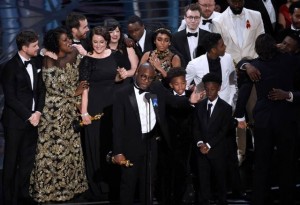 To complete a perfect storm of elements, Warren Beatty was not quick-witted enough to realize that — because the card in his hand read, “Emma Stone, La La Land” — he had been given the wrong envelope and to immediately bring it to the attention of anybody or everybody. He just stood their dumbfounded, completely unable to process what was happening. He then did the exact wrong thing; he showed the card to Dunaway, who didn’t hesitate in announcing the wrong winner’s name. Both Beatty and Dunaway were barely able to get through their scripted lines before the opening of the envelope; a mishap of that magnitude was clearly outside their realm of comprehension and capability1. In Beatty’s defense, no presenter of any age would have expected a mistake like that, but q quit-witted person like Kimmel would have rebounded immediately and the correction would have been much more smooth. The “La La Land” producers would have been spared the embarrassment of being on the stage meant for “Moonlight”, Barry Jenkins and crew would have gotten the moment in the spotlight they deserved and we would have heard Jenkins’ prepared (and apparently inspirational) acceptance speech.
To complete a perfect storm of elements, Warren Beatty was not quick-witted enough to realize that — because the card in his hand read, “Emma Stone, La La Land” — he had been given the wrong envelope and to immediately bring it to the attention of anybody or everybody. He just stood their dumbfounded, completely unable to process what was happening. He then did the exact wrong thing; he showed the card to Dunaway, who didn’t hesitate in announcing the wrong winner’s name. Both Beatty and Dunaway were barely able to get through their scripted lines before the opening of the envelope; a mishap of that magnitude was clearly outside their realm of comprehension and capability1. In Beatty’s defense, no presenter of any age would have expected a mistake like that, but q quit-witted person like Kimmel would have rebounded immediately and the correction would have been much more smooth. The “La La Land” producers would have been spared the embarrassment of being on the stage meant for “Moonlight”, Barry Jenkins and crew would have gotten the moment in the spotlight they deserved and we would have heard Jenkins’ prepared (and apparently inspirational) acceptance speech.
On the positive side, not only did the foul-up make “Moonlight” the most memorable Best Picture winner in history, it guaranteed every single Oscar (and every other award) presenter will double-check what they read before announcing a winner. It also gave us Barry Jenkins’ — who already gave the night’s best acceptance speech when he won (with Tarell MacCraney) for Adapted Screenplay — spontaneous and emphatic reaction to winning Best Picture, “To hell with dreams! I’m done with it because this is true!.” That’s poetry you can’t script.
THE SHOW
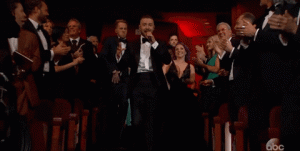 Now THAT’S how you begin an Oscar night. Even before we understood what was happening, the broadcast started in the lobby of the Kodak theater with the camera staring at the back of Justin Timberlake as he launched into his positive and energetic Oscar-nominated song “Can’t Stop the Feeling” (from “Trolls”). The camera followed, then led him as he accumulated beaming, sharply-dressed and equally energetic cohorts and they danced their way into filling the aisles in the auditorium, which had no choice but to rise to its collective feet (click on the image for a moment of that energy). It was a joyously explosive way to begin the night’s proceedings and completely obliterated what dark cloud there was that hung over the night (and the country and even the world), which we knew would have political moments. It was the best opening possible with the most appropriate of the nominated songs and the best of the performers, and it simultaneously served the function of presenting a Best Song nominee. When you thought it couldn’t get better, Timberlake segued into Bill Withers’ peace-preaching, optimistic and life-affirming “Lovely Day”, which is the antithesis in every way of what’s going on with this country politically. It was a total rush, especially seeing the entire auditorium up and moving to the music.
Now THAT’S how you begin an Oscar night. Even before we understood what was happening, the broadcast started in the lobby of the Kodak theater with the camera staring at the back of Justin Timberlake as he launched into his positive and energetic Oscar-nominated song “Can’t Stop the Feeling” (from “Trolls”). The camera followed, then led him as he accumulated beaming, sharply-dressed and equally energetic cohorts and they danced their way into filling the aisles in the auditorium, which had no choice but to rise to its collective feet (click on the image for a moment of that energy). It was a joyously explosive way to begin the night’s proceedings and completely obliterated what dark cloud there was that hung over the night (and the country and even the world), which we knew would have political moments. It was the best opening possible with the most appropriate of the nominated songs and the best of the performers, and it simultaneously served the function of presenting a Best Song nominee. When you thought it couldn’t get better, Timberlake segued into Bill Withers’ peace-preaching, optimistic and life-affirming “Lovely Day”, which is the antithesis in every way of what’s going on with this country politically. It was a total rush, especially seeing the entire auditorium up and moving to the music.
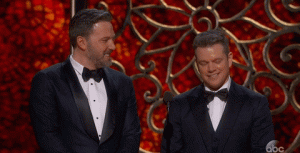 First-time host Jimmy Kimmel — an extremely savvy choice — came across as completely at ease, delivering exceptional and inspired material even better than the writers probably expected and I looked forward to every deadpan word he said. First up was a segment dedicated to the “overrated” Meryl Streep. The humor was taken up a notch with Kimmel’s ongoing and brutal ribbing of Matt Damon (the failure and $80 million loss of “The Great Wall” and his hope of seeing Damon lose the Best Picture Oscar), continuing the relationship that has evolved from Damon’s appearances on Kimmel’s talk show. That running gag reached a brilliant and literal crescendo when Screenplay presenters (and 1998 co-winners for Original Screenplay) Damon and Ben Affleck were introduced as “Ben Affleck and guest” (click the image for Damon’s reaction).
First-time host Jimmy Kimmel — an extremely savvy choice — came across as completely at ease, delivering exceptional and inspired material even better than the writers probably expected and I looked forward to every deadpan word he said. First up was a segment dedicated to the “overrated” Meryl Streep. The humor was taken up a notch with Kimmel’s ongoing and brutal ribbing of Matt Damon (the failure and $80 million loss of “The Great Wall” and his hope of seeing Damon lose the Best Picture Oscar), continuing the relationship that has evolved from Damon’s appearances on Kimmel’s talk show. That running gag reached a brilliant and literal crescendo when Screenplay presenters (and 1998 co-winners for Original Screenplay) Damon and Ben Affleck were introduced as “Ben Affleck and guest” (click the image for Damon’s reaction). 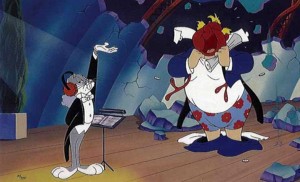 Damon barely got two words out when the get-off-the-stage music started playing and the camera revealed Kimmel conducting the orchestra, holding the loudest note for a mercilessly long time, like Bug Bunny sadistically tormenting the opera singer in the classic 1949 Chuck Jones short, “The Long-Haired Hare.”3 The interspersed segments showing actors in a movie theater explaining movies and actors that touched them were wonderful all on their own. To have them culminate with Kimmel watching Matt Damon in “We Bought a Zoo” and introspectively, cryptically and sarcastically dissecting how Damon “has almost no discernible talent but…it works” was comic genius.
Damon barely got two words out when the get-off-the-stage music started playing and the camera revealed Kimmel conducting the orchestra, holding the loudest note for a mercilessly long time, like Bug Bunny sadistically tormenting the opera singer in the classic 1949 Chuck Jones short, “The Long-Haired Hare.”3 The interspersed segments showing actors in a movie theater explaining movies and actors that touched them were wonderful all on their own. To have them culminate with Kimmel watching Matt Damon in “We Bought a Zoo” and introspectively, cryptically and sarcastically dissecting how Damon “has almost no discernible talent but…it works” was comic genius.
Kimmel live-tweeting Trump on the auditorium’s screen was hilarious, especially when he typed “Merylsayshi.”
Dropping the candy, cookies and donuts in little parachute bags into the audience injected energy and brought out the child in the attendees and the viewing audience. It served to de-starch the pants of anyone not paying attention to the show’s opening or anything Kimmel (and any of the presenters) was saying. More evidence of the show’s relentlessly creative, throw-out-all-the-rules writing.
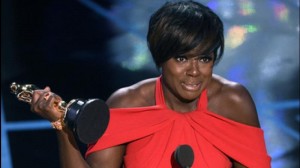 The presentation of the Governors Awards was a nice acknowledgement but disrupted the momentum of the night. It did serve as a nice segue into the Best Supporting Actress presentation. That win resulted in the night’s most agonizingly long, squirm-inducing and momentarily-confusing — however thoughtful and well-deserved — acceptance speech, given by Viola Davis for “Fences”.
The presentation of the Governors Awards was a nice acknowledgement but disrupted the momentum of the night. It did serve as a nice segue into the Best Supporting Actress presentation. That win resulted in the night’s most agonizingly long, squirm-inducing and momentarily-confusing — however thoughtful and well-deserved — acceptance speech, given by Viola Davis for “Fences”.
The segment of people of different countries explaining what movies mean to them was thoughtful, touching and unifying.
Celebrities reading out loud mean tweets directed at them was hilarious, especially when they laughed at the tweets themselves. It was perfect to finish the segment with Robert de Niro saying “f__k you” to his tweeter, who accused De Niro of only being able to play “grandfather roles.”
I always snore through the Science and Technology awards segment but presenters John Cho and Leslie Mann were hilarious with their over-explanations. Great delivery of, again, exceptional writing in a segment that badly needs it.
Kate McKinnon and Jason Bateman skillfully and hilariously presented the awards for Makeup and Hair Design.
The segments of short films based on Walmart receipts — basically creative and expensive Walmart commercials — added a unique element to the proceedings. The segments were directed by Marc Forster (“Monster’s Ball”, “Finding Neverland”), Antoine Fuqua (“Training Day”, which will always be his best film) and the team of Seth Rogen and Evan Goldberg (“This is the End”).
I enjoyed the night’s acknowledgement of the career of wonderfully versatile Shirley MacLaine (Warren Beatty’s sister), who was lucid and funny as ever, before she (along with Charlize Theron) presented the Oscar for Best Foreign Language Film. (It isn’t until after the Oscars that I even know which of the year’s foreign movies to watch, which is counterintuitive, I know.) The timeliness, significance and eloquence of the acceptance speech delivered by a proxy for the winner, Iranian Asghar Farhadi (for “The Salesman”), was lost on no one.
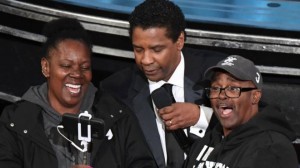 The tour bus idea was a great prank but it was even more uncomfortably long than Viola Davis’ acceptance speech. Because he was the first one in the line, I couldn’t help but notice the guy who identified himself as “Gary from Chicago” had an odd reaction to being at the Oscars. It was as though he wasn’t surprised at all and he expected it to be part of the tour. It made sense to later find out that he had just gotten out of prison a few days prior after 20 years for “a series of thefts” and had been convicted of attempted rape at the age of 20. Proof that — as Jon Waters said during a 2015 commencement speech to the Rhode Island School of Design — there is no such thing as karma. Denzel Washington and Jennifer Aniston were both great sports in interacting with Gary from Chicago and his what-is-she-thinking fiancé, Anniston giving up a pair of $650 sunglasses as a gift because Kimmel forced her to. The group’s smart phone camera footage as they entered the auditorium has to be priceless.
The tour bus idea was a great prank but it was even more uncomfortably long than Viola Davis’ acceptance speech. Because he was the first one in the line, I couldn’t help but notice the guy who identified himself as “Gary from Chicago” had an odd reaction to being at the Oscars. It was as though he wasn’t surprised at all and he expected it to be part of the tour. It made sense to later find out that he had just gotten out of prison a few days prior after 20 years for “a series of thefts” and had been convicted of attempted rape at the age of 20. Proof that — as Jon Waters said during a 2015 commencement speech to the Rhode Island School of Design — there is no such thing as karma. Denzel Washington and Jennifer Aniston were both great sports in interacting with Gary from Chicago and his what-is-she-thinking fiancé, Anniston giving up a pair of $650 sunglasses as a gift because Kimmel forced her to. The group’s smart phone camera footage as they entered the auditorium has to be priceless.
Sarah Bareilles (song writer for “Waitress”, the current Broadway adaptation of Adrienne Shelly’s film2) sang Joni Mitchell’s “Both Sides Now” — a nice choice of both artist and song — for the “In Memoriam” segment, which is always a touching sendoff for people the industry lost during the year. It’s normally done with orchestration only. I had no idea Bill Nunn — a peaceful guy who played the menacing and militant Radio Raheem in Spike Lee’s 1989 seminal magnum opus “Do the Right Thing” — had passed away at the age of 63.
THE AWARDS
I never wanted “La La Land” to win all the awards I picked them for; I just thought they’d win them. I’m glad the wealth was spread.
The wins for the Film Editing and Sound Mixing on “Hacksaw Ridge” were well deserved and outstanding work was rewarded. Not only do battle scenes have high demands to be seamless and impactful, they implicitly have to raise the bar for war movies, and “Hacksaw Ridge” did exactly that, ironically for a story about a non-violent soldier.
Casey Affleck’s Oscar should be engraved “Least Deserving Best Actor Oscar Winner.” A low point for me. By far the worst nomination of all the acting categories, maybe all the categories period. You could have put Gary from Chicago in that role and got a more emotional performance.
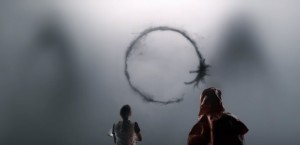 I had to check just now to make sure I got this right: “Captain Fantastic”, “Lion”, “Hell or High Water”, “Hidden Figures” and “Loving” went home empty-handed but “Arrival” won an Oscar? OK, I’ll explain what “Arrival” did for their Sound Editing Oscar: They recorded a creaking door, ran it through a bunch of filters, lowered the frequency, slowed it down a lot and added reverb, echo and resonance to come up with the sound that won their Oscar. Either that or they just recorded Ted Cassidy (a wonderful character and voice actor) doing his Lurch moan from The Adams Family TV show.
I had to check just now to make sure I got this right: “Captain Fantastic”, “Lion”, “Hell or High Water”, “Hidden Figures” and “Loving” went home empty-handed but “Arrival” won an Oscar? OK, I’ll explain what “Arrival” did for their Sound Editing Oscar: They recorded a creaking door, ran it through a bunch of filters, lowered the frequency, slowed it down a lot and added reverb, echo and resonance to come up with the sound that won their Oscar. Either that or they just recorded Ted Cassidy (a wonderful character and voice actor) doing his Lurch moan from The Adams Family TV show.
It was a bonus that Katherine Johnson, one of the woman whose achievements were depicted in “Hidden Figures”, was brought out to the stage with that film’s three leads. They presented the Oscar for Best Documentary Feature to “O.J.: Made in America”, a mini-series that ran almost eight hours. It must have been eligible for a nomination in the most technical way, like being released in a theater in LA for one day before it aired on TV. Netflix’s mini-series “Making a Murderer” was better. I can imagine every 2017 documentary mini-series will now open for one week in Los Angeles theater before they air on TV or streaming service so they can get in on that action.
My favorite acceptance speech was by Barry Jenkins, who was positive, articulate and concise after his win for Adapted Screenplay. He was also humble and justifiably beside himself after we all finally realized “Moonlight” won Best Picture. Dreams do indeed come true. Again, while he was robbed of his even-bigger moment by the Best Picture foul-up, his win was made all the more memorable for that very reason.
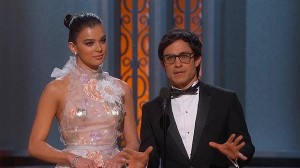 The political statements, including those made by Mark Rylance and Gael García Bernal, were understated, concise and thoughtful. Vanessa Redgrave set the bar for what political statements should NOT be during her angry “zionist hoodlums” acceptance speech for her Best Actress win for 1977’s “Julia.” Even more memorable was that night’s screenplay presenter Paddy Chayefsky’s response, “I’m sick and tired of people exploiting the occasion of the Academy Awards for the propagation of their own political propaganda. Redgrave’s win is not a pivotal moment in history, and it doesn’t require a proclamation.” Never piss off a three-time Academy Award-winning writer, although I am bothered that he used similar-sounding “propagation” and “propaganda” in the same sentence. I still remember that moment in 1977; I’d never heard the word “zionist” before that.
The political statements, including those made by Mark Rylance and Gael García Bernal, were understated, concise and thoughtful. Vanessa Redgrave set the bar for what political statements should NOT be during her angry “zionist hoodlums” acceptance speech for her Best Actress win for 1977’s “Julia.” Even more memorable was that night’s screenplay presenter Paddy Chayefsky’s response, “I’m sick and tired of people exploiting the occasion of the Academy Awards for the propagation of their own political propaganda. Redgrave’s win is not a pivotal moment in history, and it doesn’t require a proclamation.” Never piss off a three-time Academy Award-winning writer, although I am bothered that he used similar-sounding “propagation” and “propaganda” in the same sentence. I still remember that moment in 1977; I’d never heard the word “zionist” before that.
I’ll wrap up with the performances of the other Best Song nominees:
“How Far I’ll Go” from “Moana”
Performed by writer and producer Lin-Manuel Miranda and Auli’i Cravalho, who voiced the title character in the film. Miranda rapped the intro, which I guess is necessary for the Oscars to connect with younger viewers and Cravalho sang it well. I was glad it got out of the way early. Simultaneously too hip and too show tune-y. Maybe I’m bitter because I’ll never be able to obtain a ticket to “Hamilton” in my lifetime.
“The Empty Chair” from “Jim: The James Foley Story”
Performed by Sting, who also co-wrote. As touching as the acoustic guitar performance was, I felt I was looking at Sting’s grandfather, who would chase his younger self away with a broom if he got too close to grampa Sting’s lawn. Better to mature and evolve than Madonna’s seeming refusal to do either. I’ll keep an eye out for the movie on Netflix streaming.
“City of Stars” (which won) and “Audition (Fools Who Dream)” (which should have) from “La La Land”
Performed by John Legend, who did nothing but cement my opinion that he is derivative and uninspiring. He completely stripped both songs of all their heart. They’d have done much better having the actors themselves sing, especially a Gosling-free Stone with “Audition.” Legend should be playing “Misty” and Cole Porter standards in lounges.
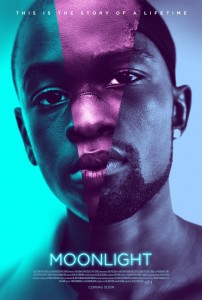 I’m hesitant to say, because I try to avoid hyperbole (believe it or not), but I think that was the Best Oscar broadcast I’ve seen. Either way, it was an appropriate sendoff to a great year in movies and a bizarre year for this country.
I’m hesitant to say, because I try to avoid hyperbole (believe it or not), but I think that was the Best Oscar broadcast I’ve seen. Either way, it was an appropriate sendoff to a great year in movies and a bizarre year for this country.
Let’s close this write-up by reiterating a point I made at the beginning that was lost in focusing on a now-historic blunder:
“Moonlight”, a small, personal, unique and powerful black-themed, gay-themed, black-written, black-directed film is the 2017 Best Picture Academy Award winner.
DPW
March 1, 2017
______________________________________________________
1 I walked by Faye Dunaway outside the Shrine Auditorium immediately after the 1997 Oscars and I had to stop myself from staring as she was talking to the press because she seemed old then. I had to fight the urge to pinch her cheek because her skin appeared unnaturally tight, like it had been taped back. And that was 20 years ago.
2 Adrienne Shelly wrote and had a supporting role in the film “Waitress.” She was murdered in her Greenwich Village apartment on November 1, 2006 by an Ecuadorian illegal immigrant construction worker. That tragedy pervaded throughout an early screening of the film I attended in Manhattan, the uplifting fantasy ending made all the more eerie and poignant by her passing and its circumstances. The film released in May 2007. I was not familiar with Shelly’s work prior to her murder.
3 Here’s the full moment “Ben Affleck and guest” moment: http://oscar.go.com/news/oscar-news/jimmy-kimmel-s-7-best-moments-as-oscars-2017-host
My DVR missed the Best Picture presentation because the show went more than 30 minutes past its scheduled end time and I was so focused on the broadcast I neglected to extend it further. I blame it on the tour group segment.
Something just occurred to me: I never once came across anything that mentioned Spike Lee’s opinion of “Moonlight.” Since he considers himself the first and last word on black film and black film makers, I find that extremely odd. If that’s the case, you have to question the reason. Lee tends to make us pay attention when he criticizes other film makers (usually when they have a big movie out) as follows:
– Criticizing Steven Spielberg for not being black enough to direct “The Color Purple”
– Criticizing Quentin Tarantino for his excessive use of the N-word and accusing him of trying to be black
– Threatening to “crush” John Singleton because he himself was threatened by Singleton’s outstanding “Boyz ‘n’ the Hood”
– Criticizing Clint Eastwood for the lack of blacks in Eastwood’s 2006 WW II movies, “Flags of Our Fathers” and “Letters from Iwo Jima”
All of those instances were headline generating stories. I’m guessing his silence on “Moonlight” is about jealousy or the film’s gay theme. Or both.

